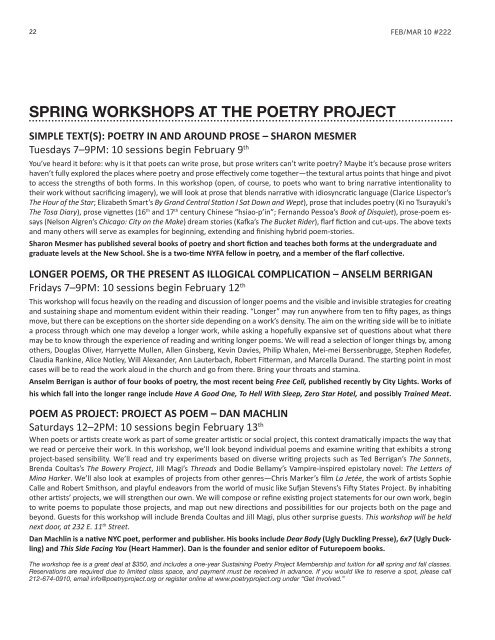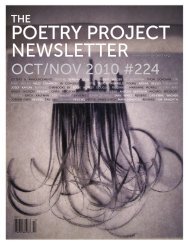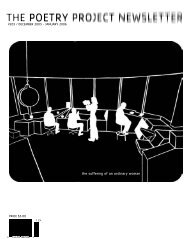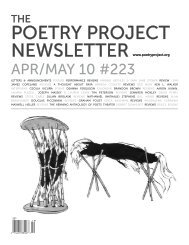You also want an ePaper? Increase the reach of your titles
YUMPU automatically turns print PDFs into web optimized ePapers that Google loves.
22 FEB/MAR 10 #222<br />
SPRING WORKSHOPS AT THE POETRY PROJECT<br />
SIMPLE TEXT(S): POETRY IN AND AROUND PROSE – SHARON MESMER<br />
Tuesdays 7–9PM: 10 sessions begin February 9 th<br />
You’ve heard it before: why is it that poets can write prose, but prose writers can’t write poetry? Maybe it’s because prose writers<br />
haven’t fully explored the places where poetry and prose effectively come together—the textural artus points that hinge and pivot<br />
to access the strengths of both forms. In this workshop (open, of course, to poets who want to bring narrative intentionality to<br />
their work without sacrificing imagery), we will look at prose that blends narrative with idiosyncratic language (Clarice Lispector’s<br />
<strong>The</strong> Hour of the Star; Elizabeth Smart’s By Grand Central Station I Sat Down and Wept), prose that includes poetry (Ki no Tsurayuki’s<br />
<strong>The</strong> Tosa Diary), prose vignettes (16 th and 17 th century Chinese “hsiao-p’in”; Fernando Pessoa’s Book of Disquiet), prose-poem essays<br />
(Nelson Algren’s Chicago: City on the Make) dream stories (Kafka’s <strong>The</strong> Bucket Rider), flarf fiction and cut-ups. <strong>The</strong> above texts<br />
and many others will serve as examples for beginning, extending and finishing hybrid poem-stories.<br />
Sharon Mesmer has published several books of poetry and short fiction and teaches both forms at the undergraduate and<br />
graduate levels at the New School. She is a two-time NYFA fellow in poetry, and a member of the flarf collective.<br />
LONGER POEMS, OR THE PRESENT AS ILLOGICAL COMPLICATION – ANSELM BERRIGAN<br />
Fridays 7–9PM: 10 sessions begin February 12 th<br />
This workshop will focus heavily on the reading and discussion of longer poems and the visible and invisible strategies for creating<br />
and sustaining shape and momentum evident within their reading. “Longer” may run anywhere from ten to fifty pages, as things<br />
move, but there can be exceptions on the shorter side depending on a work’s density. <strong>The</strong> aim on the writing side will be to initiate<br />
a process through which one may develop a longer work, while asking a hopefully expansive set of questions about what there<br />
may be to know through the experience of reading and writing longer poems. We will read a selection of longer things by, among<br />
others, Douglas Oliver, Harryette Mullen, Allen Ginsberg, Kevin Davies, Philip Whalen, Mei-mei Berssenbrugge, Stephen Rodefer,<br />
Claudia Rankine, Alice Notley, Will Alexander, Ann Lauterbach, Robert Fitterman, and Marcella Durand. <strong>The</strong> starting point in most<br />
cases will be to read the work aloud in the church and go from there. Bring your throats and stamina.<br />
Anselm Berrigan is author of four books of poetry, the most recent being Free Cell, published recently by City Lights. Works of<br />
his which fall into the longer range include Have A Good One, To Hell With Sleep, Zero Star Hotel, and possibly Trained Meat.<br />
POEM AS PROJECT: PROJECT AS POEM – DAN MACHLIN<br />
Saturdays 12–2PM: 10 sessions begin February 13 th<br />
When poets or artists create work as part of some greater artistic or social project, this context dramatically impacts the way that<br />
we read or perceive their work. In this workshop, we’ll look beyond individual poems and examine writing that exhibits a strong<br />
project-based sensibility. We’ll read and try experiments based on diverse writing projects such as Ted Berrigan’s <strong>The</strong> Sonnets,<br />
Brenda Coultas’s <strong>The</strong> Bowery <strong>Project</strong>, Jill Magi’s Threads and Dodie Bellamy’s Vampire-inspired epistolary novel: <strong>The</strong> Letters of<br />
Mina Harker. We’ll also look at examples of projects from other genres—Chris Marker’s film La Jetée, the work of artists Sophie<br />
Calle and Robert Smithson, and playful endeavors from the world of music like Sufjan Stevens’s Fifty States <strong>Project</strong>. By inhabiting<br />
other artists’ projects, we will strengthen our own. We will compose or refine existing project statements for our own work, begin<br />
to write poems to populate those projects, and map out new directions and possibilities for our projects both on the page and<br />
beyond. Guests for this workshop will include Brenda Coultas and Jill Magi, plus other surprise guests. This workshop will be held<br />
next door, at 232 E. 11 th Street.<br />
Dan Machlin is a native NYC poet, performer and publisher. His books include Dear Body (Ugly Duckling Presse), 6x7 (Ugly Duckling)<br />
and This Side Facing You (Heart Hammer). Dan is the founder and senior editor of Futurepoem books.<br />
<strong>The</strong> workshop fee is a great deal at $350, and includes a one-year Sustaining <strong>Poetry</strong> <strong>Project</strong> Membership and tuition for all spring and fall classes.<br />
Reservations are required due to limited class space, and payment must be received in advance. If you would like to reserve a spot, please call<br />
212-674-0910, email info@poetryproject.org or register online at www.poetryproject.org under “Get Involved.”

















